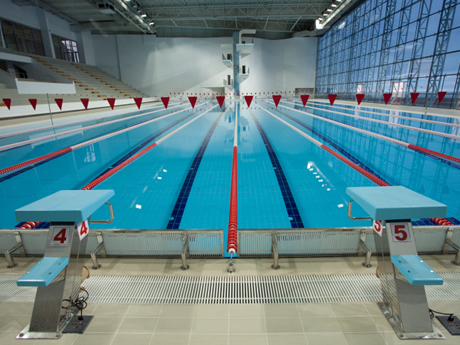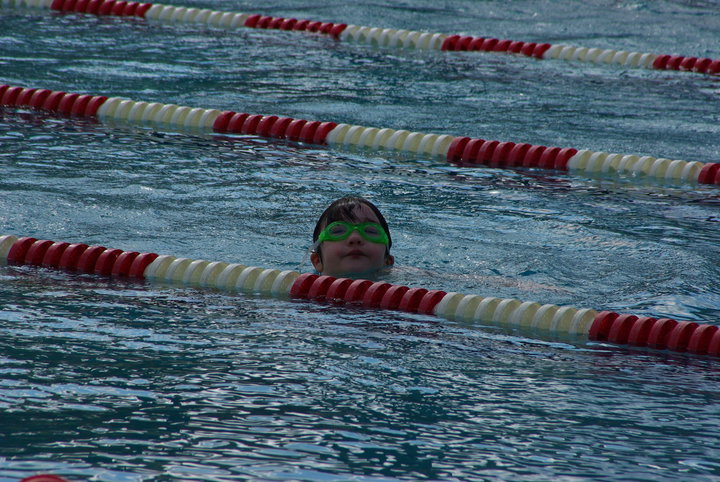 Today I’d like to discuss exactly what people mean when they call a pool “fast”. I’m sure you’ve heard people talk about some pools being good or fast while other pools are to be dreaded. So what is it that makes some pools more desirable than others, and do they actually make swimmers go faster?
Today I’d like to discuss exactly what people mean when they call a pool “fast”. I’m sure you’ve heard people talk about some pools being good or fast while other pools are to be dreaded. So what is it that makes some pools more desirable than others, and do they actually make swimmers go faster?
Everyone take a second and get ready to fire up the science portion of your brains because fast pools are all about physics.
Characteristics of a “fast pool”:
- Deep water– The deeper the water the less turbulence comes back off the bottom to hit the swimmers…smooth water is easier to move through. Ideally pools with deep water all the way across the pool are the best.
- More Lanes – Generally the more lanes there are the faster the pool…to see why next time you go to a 4 lane pool watch the water during and after a race and compare how many waves and how choppy the water is versus a pool that has 8-10 lanes. More lanes also often mean faster meets…which is always a plus for parents!
- Buffer Lanes – Often faster pools will have space between the outer lanes and the walls. Sometimes this is a half lane, sometimes more. This gives more spaces to reduce the effect of the water bouncing off the walls and hitting the nearby swimmers.
- Good gutter systems – Some pools have nice deep gutter systems specifically designed to absorb waves to reduce water turbulence.
- Good lane Lines- Some lane lines are specially designed to reduce water turbulence.
- Water temperature – Many people will tell you that the colder the water the faster you’ll swim…well that’s not entirely accurate. For example, at one meet a few summers ago my son came out of the pool and was literally blue (little did we know the pool’s heater had died the night before)…trust me in this case colder did NOT mean faster…honestly it’s a wonder he’s not still trying to finish his last race! Anyway…F.I.N.A ‘s standard requirement for big senior level meets is 26 degrees C. plus or minus 1 degree. (That converts to 78.8 degrees F). In my experience many of the pools kids compete & practice in are kept warmer than this, so when swimmers come into contact with a pool that is kept closer to an optimal competitive temperature it feels cold to them…so I think that’s where the idea of colder = faster comes from. But in theory the closer a pool’s water temperature is to this optimal temp, the faster the pool is.
- Deck Temp – Ideally according to F.I.N.A deck/swimmer waiting area temperature should be kept 1-2 degrees C above water temp. Colder than that swimmers use energy shivering and trying to warm up, warmer than that they end up perspiring and feeling fatigued from heat. Honestly most pools that age group and high school swimmers see don’t have great deck temperature control, which is why it’s important to pack a variety deck clothes to meet your swimmer’s needs.
- Water Quality – If you look up on-line what makes a pool fast you’ll see a lot of talk of Ph levels, chemical levels, water density etc… At age group level swimming I doubt this all makes much of a difference. But I do know some pools are kept cleaner than others…and swimmers appreciate good quality water in a nice clean inviting pool. Things like cloudy water do not make for good/fast swimming….and while seeing a used band-aid floating by as you swim might make you want to get out of the pool ASAP, I’m not sure that is the type of motivation the swimmers are really hoping for.
- Good Starting Blocks & Walls– You may have noticed at the last Olympics that they had blocks with raised backs on them, or “fins”. Not all pools have them, but they are popping up more and more. These blocks are supposed to enhance your start, giving you a better push off the block. Other than the fins, I’m not entirely sure what exactly makes for great starting blocks or what makes some walls slippery and other walls great…usually when my teenage swimmers are complaining about slippery walls or craptastic blocks I’m too busy telling them “We got up at 5 am and paid 3 billion dollars for you to be here…now suck it up and go swim fast!” (Yeah, I know I’m a regular mom of the year candidate at those early morning meets) But I do know that my son will occasionally talk about good blocks when he finds them, so apparently some are indeed better than others. I believe it has to do with good traction, good stability, a good angle, and sufficient height from the deck.
So do these things actually make you swim faster?
 In this swim mom’s opinion I think the answer is…yes and no.
In this swim mom’s opinion I think the answer is…yes and no.
Absolutely better conditions and better pools make getting faster times more likely, as it can give both a psychological edge and helps physics work in your favor. For elite swimmers, they really do need optimal conditions to get best times. Even if you convinced Michael Phelps to swim in a 4 lane YMCA pool I doubt any world records would be in jeopardy. He’d still be ridiculously fast of course, but he’s unlikely to reach optimal speeds in non-optimal conditions. Even with your fastest age group or high school swimmers you are most likely to see team records and best times set at pools with more of the above conditions in play. Though they can still be darn impressive in even an average pool. The younger and less experienced you are, the less a good pool matters. More experienced swimmers are looking to drop tenths of a second at a time, and they can find this time in a good pool (combined of course with great training habits). Younger and less experienced swimmers can find huge time cuts by doing things like improving starts, increasing endurance, lengthening & improving their stroke, kicking harder, breathing less often etc…these things will improve their times dramatically in any pool. Now a great pool can benefit these swimmers as well, sometimes just the excitement of swimming in a “fast” or big fancy pool will work wonders for them. Certainly having more optimal conditions won’t hurt either. But if you see a great time drop from your younger/less experienced kids it’s more likely to be attributed to technique improvement rather than pool quality.
Though I will also mention that it is a great idea to introduce younger swimmers to these bigger nicer pools as soon as you can because sometimes they can be a little intimidating. Some kids get excited by it, others get nervous, and you really won’t know for sure how they’ll react until you leave them on the deck and they head to the starting blocks. Many big championship meets, even for age groupers, are held in these types of pools, so the more exposure they have to them the more comfortable they’ll be at championships. So be sure to watch for and take advantage of opportunities to swim at the bigger “faster” pools in your area.
Perks to Parents:
 There is another secret about fast/good pools. Often, though not always, the good/fast pools are also better for parents/spectators. For example, one of my favorite pools that my boys occasionally swim at is the Spire Institute in Geneva, Ohio. It is more than an hour away, but well worth the trip. Picture it…. 10 lanes, double competition pool (giving the ability to swim both sides of the pool simultaneously to make for shorter meets)), jumbo-tron scoreboard, restaurant style concessions, 2 lady’s & 2 men’s rooms all large enough so there was never a line, ventilated spectator area so there was a slight breeze, tolerable heat & humidity, and limited chlorine fumes (due to a high tech system in the pool area specifically designed to reduce the chlorine smell)…and best of all….plenty of quality spectator seating WITH…..(wait for it)….. BACKS ON THE CHAIRS. I’m telling ya it was a swim mom’s dream… all that was missing was the waiter selling fruity umbrella decorated beverages. Oh yeah, and the kids always have fun and swim well there too.
There is another secret about fast/good pools. Often, though not always, the good/fast pools are also better for parents/spectators. For example, one of my favorite pools that my boys occasionally swim at is the Spire Institute in Geneva, Ohio. It is more than an hour away, but well worth the trip. Picture it…. 10 lanes, double competition pool (giving the ability to swim both sides of the pool simultaneously to make for shorter meets)), jumbo-tron scoreboard, restaurant style concessions, 2 lady’s & 2 men’s rooms all large enough so there was never a line, ventilated spectator area so there was a slight breeze, tolerable heat & humidity, and limited chlorine fumes (due to a high tech system in the pool area specifically designed to reduce the chlorine smell)…and best of all….plenty of quality spectator seating WITH…..(wait for it)….. BACKS ON THE CHAIRS. I’m telling ya it was a swim mom’s dream… all that was missing was the waiter selling fruity umbrella decorated beverages. Oh yeah, and the kids always have fun and swim well there too.
So, what are some of the better pools in your area like?
Follow me on Twitter @Swim_Team_101
Like us on Facebook

